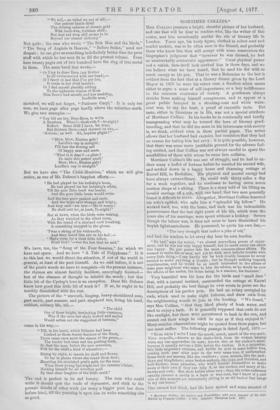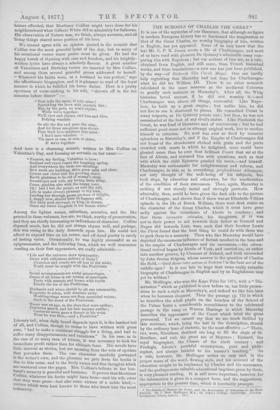MORTIMER COLLINS.* Mits. Commes presents a bright, cheerful picture of
her husband, and one that will be dear to readers who, like the writer of this notice, met him occasionally amidst the stir of literary life in London. Years ago, his burly figure, clothed in velvet coat and scarlet necktie, was to be often seen in the Strand, and probably those who knew him then will accept with some reservation the biographer's judgment that "however he was dressed, ho had an unmistakably aristocratic appearance." Great physical power and a rakish, dare-devil look marked him in those days, and we can believe what we have heard, that he used his fist with as much energy as his pen. That he was a Bohemian to the last is evident from the fact that at a literary dinner given by the Lord Mayor in 1876 he wore his velvet coat, a freedom which seems either to argue a sense of self-importance, or a lazy indifference to the common courtesies of society. A gentleman always shrinks from making himself conspicuous, and to appear at a great public banquet in a shooting-coat and white waist- coat was, to say the least, a proof of execrable taste. But taste, either in literature or in life, was not a special attribute of Mortimer Collins. In his books he is continually and loudly transgressing what may be termed the laws of literary good- breeding, and that he did the same in his intercourse with society is, we think, evident even in these partial pages. The writer allows that her husband had enemies, but considers that they had no reason for hating him but envy ; it is quite possible, however, that there was some more justifiable ground for the adverse feel- ing excited, and that Collins was not always careful to spare the sensibilities of those with whom he came into collision.
Mortimer Collins's life was one of struggle, and he had to en- dure many a buffet of fortune before he married his second wife, and settled down in a happy home and charming cottage at Knowl Hill, in Berkshire. His physical and mental energy had been always extraordinary. He could walk thirty miles a day for a week together, and he confesses to having eaten seven mutton chops at a sitting. There is a story told of his lifting an invalid carriage off a cab, with one hand, that two men generally found it difficult to move. Altogether, Mortimer Collins deserved
his wife's epithet, who calls him a "splendid big fellow." He
worked hard, too, with the brain, and such was his indomitable perseverance that the last eight years of his life, which were the years also of his marriage, were spent without a holiday. Severe
though the labour was, it does not seem to have diminished his boyish lightheartedness. He possessed, to quote his own line,— " The easy strength that makes a joke of toil," and had the wisdom to let every day bear its own burden.
"He had," says the writei "an almost marvellous power of enjoy- ment, and be was not only happy himself, but he made every one about him happy. He put poetry into the most common-place affairs. He seemed to make life so easy, and yet he took such infinite trouble with every little thing,—I can hardly say he took trouble, because he never seamed to make anything a trouble; but ho thought nothing beneath consideration, and he wonld be as much interested iii the affairs of some poor neighbour who came to him for advice, SR he would be over the affairs of the nation, the latter being, in a manner, his business."
Very beautiful was his love for the birds and "small deer" that, with a natural instinct, surrounded the cottage at Know! Hill, and probably the best things he ever wrote in prose are the descriptions of his garden pets. He had an aviary occupied by owls, which used to make night hideous, and drew owls from the neighbouring woods to join in the booting. "We found," says Mrs. Collins, "that they liked plenty of fresh water, and used to enjoy a bath. It is generally supposed that owls do not
like sunlight, but these were accustomed to bask in the sun, and stretch out their wings to catch its rays as if they enjoyed it."
Many ornithic observations might be quoted from these pages, but one must suffice. The following passage is dated April, 1870
Even while I write I hoar the quack, quack, quack of the wry-neck, Yunx torqui I la ,—known as the snalto.bird, from its violent hissing when any one approaches its nest ; known also as the cuckoo's mate, because it usually arrives a little before the cuckoo. It is a carpenter, this little migratory creature, and builds its nest in some hollow tree, coming back year after year to the very same tree, if undisturbed. Some birds are masons, like the swallows ; some miners, like the jack- daws and kingfishers; some basket-makers, like jays, and thrushes, and bull-finches; some parasites, who won't trouble themselves to make nests of their own if they can help it, as the cuckoo, and many of the hawks and owls. But their habits often vary ; thus, the robin-redbreast usually chooses a cavity in a bank or tree-root, but I know of a pair who at this moment are contentedly sitting in an old basket that hangs in my out-house."
One cannot but think, had life been spared and some amount of
* ifforlimer Collins: Si, Lettere and Friendships, with some Account of his Life. Edited by Frances Collins. 2 vols. London: Sampson Low. 1877.
leisure afforded, that Mortimer Collins might have done for his neighbourhood what Gilbert White did so admirably for Selborne. :His observation of Nature was, we think, always accurate, and all living things shared some portion of his love.
We cannot agree with an opinion quoted in the memoir that Collins was the most graceful lyrist of the day, but to many of his occasional verses warm praise must be given. He had the happy knack of rhyming with ease and freedom, and his brightly- written lyrics have always a scholarly flavour. A great number -of Valentines and Birthday verses are inserted by Mrs. Collins, and among them several graceful pieces addressed to herself.
"Whatever his faults were, as a husband he was perfect," says the affectionate biographer, and it is pleasant to read of the loyal manner in which he fulfilled his home duties. Here is a pretty specimen of verse-making to his wife, "thrown off in the ten minutes before dinner" ;—
"Fast falls the snow, 0 lady mine !
Sprinkling the lawn with orystala fine ; But, by the gods, we won't repine, Virhilo we're together.
We'll chat and rhyme, and kiss and dine, Defying weather.
So stir the Eire nd pour the wine, And let those sea-green eyes divine Pour their love-madness into mine: I don't care whether • 'Tis snow or sun, or rain or shine, If we're together
And here is a charming sonnet, written to Mrs. Collins on Valentine's Day, and forming an acrostic on her name :— " Frances, my darling, Valentine is here ;
Radiant and royal comes the laughing spring, And everywhere the birds are carolling, New nests are building, skies grow calm and clear, Crocus and violet hail the growing cheer, Earth gladdens to be rid of winter's sting. Sweetheart and wife, my loving little thing, Come, gladden also with the happy year. Oh I had I but the power, as now the will, Life to mako always pleasant to my own, Leading her through green gardens of delight, I, happy now, should then be happier still, Nor envy poet crowned, or king on throne, Since my sweet kingdom is her bosom white."
Among the lighter verses, valentines, acrostics, and the like printed in these volumes, few are, we think, worthy of preservation,
and they are chiefly interesting as indications of character. Collins rhymed much, but he did not always rhyme well, and perhaps, this was owing to the daily demands upon him. He could not afford to expend time on his verses, and off-hand poetry is rarely -of lasting value. .Occasionally, he was highly successful as an epigrammatist, and the following lines, which we well remember
reading on their first appearance, are really admirable :-
"Life and the universe show spontaneity, Down with ridiculous notions of Deity 1 Churches and creeds are all lost in the mists, . Truth must be sought with the Positivists.
.. .... • Social arrangements are awful miscarriages, Cause of all crime is our system of marriages. Poets with sonnets and lovers with trysts Kindle the ire of the Positivists.
Husbands and wives should be all one community, Exquisite frk edom, with absolute unity. Wedding-rings worse are than manacled wrists; Such is the creed of the Positivists.
There was an ape, in the days that were earlier; Centuries pass'd, and'his hair became curlier ; Centuries more gave a thumb to his wrist. Then he was Man,—and a Positivist."
Literary toil, when daily bread depends upon it, is the hardest toil of all, and Collins, though he seems to have written with great ease, "had to make a continual struggle for a living, and had to suffer many disappointments and vexations." In his case, as in the case of so many men of letters, it was necessary to look for immediate profit rather than for ultimate fame. His novels have little interest as stories, but are amusing from the vein of egotism
that pervades them. The one character carefully portrayed is the writer's own, and the pleasure we gain from his books is
due to this cause, and to the lively verses and fine thoughts which are scattered over the pages. Mrs. Collins's tribute to her hus-
band's memory is graceful and feminine. It proves that Mortimer Collins, whatever his faults might have been—and his wife owns that they were great—had also some virtues of a noble kind,—
'virtues which were best known to those who knew him the most intimately.



































 Previous page
Previous page